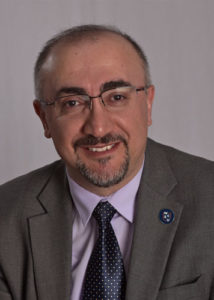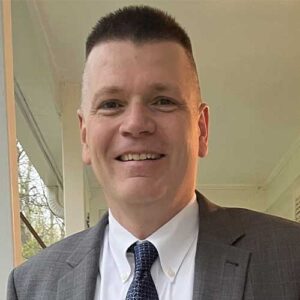Homeland Security Faculty
James F. ‘Jimmy’ Albrecht
 James F. Albrecht started his law enforcement career as an Auxiliary (volunteer) Police Officer in the New York City Police Department, where he served three years in the 112th Precinct. Jim is a 20-year veteran of the NYPD. He retired as the Commanding Officer of NYPD Transit Bureau District 20, responsible for the supervision and deployment of over 300 police officers tasked with the prevention of crime and terrorism in the subway and rapid transit system in the borough of Queens, New York City. Captain Albrecht was a first responder and incident command staff member at the September 11, 2001, terrorist attack on the World Trade Center and the incident commander at the November 12, 2001, commercial airliner accident in Queens, NYC.
James F. Albrecht started his law enforcement career as an Auxiliary (volunteer) Police Officer in the New York City Police Department, where he served three years in the 112th Precinct. Jim is a 20-year veteran of the NYPD. He retired as the Commanding Officer of NYPD Transit Bureau District 20, responsible for the supervision and deployment of over 300 police officers tasked with the prevention of crime and terrorism in the subway and rapid transit system in the borough of Queens, New York City. Captain Albrecht was a first responder and incident command staff member at the September 11, 2001, terrorist attack on the World Trade Center and the incident commander at the November 12, 2001, commercial airliner accident in Queens, NYC.
Captain Albrecht has extensive law enforcement experience in the NYPD, having served as a patrol officer, community policing beat officer, Police Academy criminal law instructor, firearms investigator, sergeant patrol supervisor, press information officer, community policing unit commander, supervisory research analyst for the Police Commissioner, lieutenant platoon commander, special operations lieutenant, lieutenant detective commander of internal civil rights violation investigations, executive officer (deputy precinct commander), and duty captain (designated critical and emergency incident commander). Captain Albrecht served on NYPD Police Commissioner Bratton’s Reengineering Committees from 1994 through 1995 and from 2014 through 2015. Jimmy concluded his policing career while serving in the European Union Rule of Law Mission (EULEX) in Kosovo (former Yugoslavia) as the Police Chief of the EULEX Police Executive Department, in charge of criminal investigations and tasked with coordinating international law enforcement cooperation and intelligence analysis from 2008 through 2010.
James Albrecht is presently a Professor in the Department of Criminal Justice and Homeland Security at Pace University in New York. James Albrecht received a prestigious Fulbright Fellowship in 1998 and worked as a Professor at the National Police College of Finland; and is considered an authority in Police Use of Force; Community/Zero Tolerance Policing initiatives; Police Response to Terrorism; Emergency Incident Planning, and Management; Democratic Policing; Law Enforcement Leadership Practices; Corruption Control; Developing Police Volunteer Programs; and other international criminal justice and law enforcement issues. Professor Albrecht has lectured at police facilities and universities in China, Russia, Germany, Austria, Sweden, Norway, Estonia, Finland, Italy, Turkey, Canada, Dubai, Kosovo, Macedonia, Malta, Ukraine, Trinidad & Tobago, South Africa, Taiwan, the United Kingdom, and throughout the USA; and serves as a consultant to the United Nations, the US Department of Homeland Security, the US Department of State, the US Department of Justice, the International Association of Chiefs of Police, the National Sheriffs Association, and the National Institute of Justice on terrorism and policing matters.
James Albrecht possesses separate Bachelor’s Degrees in Biology and German Language; and respective Master’s Degrees in Criminal Justice, Human Physiology, and History. Jimmy is completing his doctoral studies (Ph.D.) in Criminal Justice at the University of New Haven. James Albrecht is the recipient of a 2013 Embassy Policy Specialist Fellowship (USDOS/IREX) and was tasked with conducting research and making recommendations to improve law enforcement effectiveness and legitimacy in Ukraine.
Professor Albrecht has many published works dealing with law enforcement, community policing, legal history, corruption control, crime reduction strategies, justice-related gender issues, criminology, and international terrorism/counterterrorism:
- Effective Crime Reduction Strategies: International Perspectives
- Policing Major Events: Perspective from Across the World
- Police Reserves and Volunteers: Enhancing Police Effectiveness and Public Trust
- Police Brutality, Misconduct and Corruption: Criminological Explanations and Policy Implications
- Policing and Minority Communities: Current Issues and Global Perspectives
- Effective Police Service Delivery: Contemporary Issues and Global Perspectives
- Police and International Peacekeeping Missions
- Understanding and Preventing Community Violence
- The History of Law and Civilization
- Police Use of Force: Global Perspectives and Policy Implications
Course that he teaches in the graduate program:
- JLA 600 – Transportation and Border Security
Hasan T. Arslan, PhD
 Hasan T. Arslan received his Ph.D. degree in Criminal Justice from the College of Criminal Justice at Sam Houston State University in Huntsville, Texas, in 2008. His doctoral dissertation involved one of the most massive Eco-terrorism databases. Dr. Arslan also holds a law degree from Marmara University in Istanbul, Turkey.
Hasan T. Arslan received his Ph.D. degree in Criminal Justice from the College of Criminal Justice at Sam Houston State University in Huntsville, Texas, in 2008. His doctoral dissertation involved one of the most massive Eco-terrorism databases. Dr. Arslan also holds a law degree from Marmara University in Istanbul, Turkey.
Between 2002 and 2010, Hasan worked for the Institute for the Study of Violent Groups. The non-profit research institution was created to test the feasibility of using a relational database to identify trends, relationships, and tactics of terrorist groups using only open-source information. ISVG was awarded second place for the 2007 Noblis Innovations in Homeland Security Award (nationwide) out of the top five finalists by Harvard University John F. Kennedy School of Government. As a supervisor and assistant director in charge of open-source data collection and training, Dr. Arslan was part of a team that developed data collection strategies on terrorism & organized crime activities (particularly for the funding agencies like the U.S. Department of Justice and the U.S. Military).
Before joining WCSU as an Associate Professor, Dr. Arslan taught at various universities. His academic career began at Sam Houston State University as a doctoral student. In 2009, he went to the University of New Haven as a visiting scholar of criminal justice. In 2010, he took a full-time faculty position at Western New England University. Finally, from 2012 to 2018, he taught undergraduate and graduate courses (five years in the Online Homeland Security Master’s program) at Pace University.
Hasan Arslan joined the Division of Justice and Law Administration (JLA) at the Ancell School of Business in 2018. Dr. Arslan contributed to developing the Homeland Security track option for undergraduate students and the Online Homeland Security Master’s Program at JLA. He primarily teaches homeland security, terrorism, and research methods courses.
Dr. Arslan emphasizes the data-driven, scientific approach to identifying and analyzing the large datasets related to police use of force, extremism, terrorism, and homeland security. His primary research involves the Statistics Help Officer Training (SHOT) database that involves an ongoing comprehensive data collection to define and consolidate information on officer-involved shootings (OIS) throughout the United States. In addition, he has other large datasets: Eco-terrorism in North America, Anti-abortion violence in North America, White-collar criminals in the United States, Human Trafficking Court Cases in the United States, and Online Predators in the United States.
Dr. Arslan published journal articles, book chapters, book reviews, and conference proceedings and appeared in the domestic and foreign press. He received many certifications from various institutions. He enjoys movies, collecting artifacts, watching sports, and hiking.
In 2022, Dr. Arslan founded the Homeland Security Master’s Program as part of the Justice and Law Administration Division at WCSU and was appointed coordinator.
Course that he teaches in the graduate program:
- JLA 650 – Homeland Security Capstone Project
Robert Berry, M.A.

Robert Berry is currently the Chief of Police at Western Connecticut State University. He retired in 2023 as the Deputy Chief of Police for the Town of Greenwich, CT where he served for over 26 years with assignments in the Patrol Division, Detective Division and the Professional Standards Office. He managed major case investigations, including homicide, robbery and burglary rings and served as incident commander for numerous events such as large concerts, U.S. Presidential visits, and natural disasters.
He also served 25 years in the U.S. Army, with active duty and reserve assignments, retiring as a Colonel in the Military Police Corps. He commanded military police units at the company and battalion level and had operational assignments in Panama, Haiti, Saudi Arabia, Iraq, Kuwait, Korea and Eastern Europe. He served for over two years in the Middle East, including a year as the Operations/Executive Officer of a military police battalion in Iraq and later as the Director of Emergency Services in Kuwait for the U.S. Third Army. He also served as an adjunct faculty member of the U.S. Army Command and General Staff College and is a certified Army instructor.
His education includes a bachelor’s degree in business administration from Fordham University, a master’s degree in national security studies with a concentration in homeland security from the American Military University and a master’s degree in strategic studies from the U.S. Army War College. He has also graduated from the Joint Combined Warfighting School, the Defense Strategy Course, and the Senior Management Institute for Police.
He lives with his wife and two sons in Wilton, CT.
Course that he teaches in the graduate program:
- JLA 510 – Geopolitics and Homeland Security Strategy
Tina Bynum, Ph.D.

Dr. Bynum holds a Doctor of Management – Homeland Security from Colorado Technical University and Master of Public Administration and B.A. magna cum laude with High Distinction in Psychology from the University of Colorado.
Dr. Bynum is the former University Program Director for the College of Security Studies at Colorado Technical University and Associate Director of Operations and Educational Programs at the Center for Homeland Security, part of the National Institute of Science, Space and Security Centers at the University of Colorado, Colorado Springs. She also served as the Associate Director for the CU-Trauma, Health, and Hazards Center at the University of Colorado, Colorado Springs, where she developed a peer support program for police officers, firefighters, and emergency medical personnel to help them build resilience, cope, and recover from the effects of traumatic occupational experiences.
Dr. Bynum teaches courses in criminal justice, emergency and fire management services, public administration, and homeland security. A retired firefighter and emergency medical technician, she also volunteers as a senior emergency response planner, facilitator, and evaluator for her local community and the state.
Dr. Bynum also has over 30 years of business administration, operations and finance management, accounting, and grant-writing experience from her positions in the public, private, and nonprofit sectors, as well as having a distinguished history of volunteer work with emergency services, military veterans, and youth programs in her community.
Dr. Bynum’s research interests include exploring the social, governmental, and economic implications of homeland security, emergency management, and criminal justice issues on public policy.
Publications:
- Bynum, T., Urby, H., & Simental, A. (2022 In Progress). Working title: Voluntary Organizations Assisting in Disaster: The role and impact of nonprofit organizations in disaster management, CRC Press.
- Simental, A. & Bynum, T. (2021 In Progress). Working title: The Role of Public Health & Healthcare in Emergency Management: Preparedness, Pandemics, Present & Future Challenges post-COVID19, CRC Press.
- Simental, A., Bynum, T., Holst, J., & Cain, W. (2021). Space Security. In Masys, A., Handbook of Security Science, Springer.
- Simental, A., Bynum, T., & Holst, J. (May 2021). Implementing Space Technology and Innovations into Homeland Security and Emergency Management Operations and Activities. Pracademic Affairs (Inaugural edition).
- Simental, A. & Bynum, T. (April 2020). COVID-19 Federal Pandemic Response: Failing National Emergency Management System. C&S Resiliency Solutions, LTD.
- Simental, A. & Bynum, T. (April 2020). COVID-19 Federal Pandemic Response: The Death of U.S. Homeland Security & Emergency Management Policy. C&S Resiliency Solutions, LTD.
- Bynum, T. (November 2017). Whistleblower or Traitor? In Logan, K. G., Homeland Security and Intelligence (2 Ed), Praeger Security Intl.
- White, Bynum & Supinski (June 2016). Homeland Security: Safeguarding the U.S. from Domestic Catastrophic Destruction, CW Productions.
- Bynum, T. (March 2016). The evolution of homeland security: A hermeneutic phenomenological exploration toward defining the term, VProQuest LLC. #10037472.
- White, R., Markowski (Bynum), T. & Collins, K. (August 2010). The United States Department of Homeland Security: An Overview, 2nd Edition, Pearson.
Course that she teaches in the graduate program:
- JLA 610 – Public Health Disaster Science and Crises Management
Abdullah Cihan, Ph.D.
 Abdullah Cihan earned his Ph.D. in Criminal Justice at Sam Houston State University in 2012. He is currently teaching in the Homeland Security Master’s Program as part of the Justice and Law Administration Division at WCSU and the Division of Criminal Justice at California State University, Sacramento. Before his current positions, Abdullah served as a faculty member in the Criminal Justice Department at East Carolina University and the College of Juvenile Justice at Prairie View A&M University.
Abdullah Cihan earned his Ph.D. in Criminal Justice at Sam Houston State University in 2012. He is currently teaching in the Homeland Security Master’s Program as part of the Justice and Law Administration Division at WCSU and the Division of Criminal Justice at California State University, Sacramento. Before his current positions, Abdullah served as a faculty member in the Criminal Justice Department at East Carolina University and the College of Juvenile Justice at Prairie View A&M University.
His primary research focus includes quantitative and statistical methodologies and criminal justice-related issues. Throughout his career, Abdullah developed and taught various criminal justice-related courses at the undergraduate, master’s, and Ph.D. levels. He garnered experience in collecting, managing, and analyzing international surveys and large amounts of data from major criminal justice agencies across the U.S. Results from these efforts led to publications in peer-reviewed criminal justice and criminology journals. The list of publications can be viewed here: Abdullah Cihan Google Scholar
Course that he teaches in the graduate program:
- JLA 525 – Data Analytics and GIS for Homeland Security Professionals
Terrence P. Dwyer, J.D.

Professor Dwyer retired from the New York State Police after a 22-year career, 17½ years of which were as an Investigator in the Bureau of Criminal Investigation (BCI). His assignments were with the Special Investigations Unit (SIU), Troop K BCI, and the Violent Crimes Investigative Team (Major Crimes Unit). Prior to the New York State Police, he worked as a Correction Officer in the NYC Department of Correction and a Court Officer in the NYC Courts for 2½ years. From 1993-2001 he served in the U.S. Naval Reserve and was honorably discharged in 2001.
The majority of his assignments with the New York State Police focused on organized crime, street gang, and homicide investigations. During his time in the State Police Bureau of Criminal Investigation he worked many high-profile investigations involving cases with the FBI, U.S. Secret Service, U.S. Department of State, New York Joint Terrorism Task Force, NYPD, and Department of Homeland Security.
As an attorney in private practice, he focused mainly on public-sector labor law by representing law enforcement unions and individual officers as retained counsel in disciplinary cases, critical incidents, grievances, and arbitration. Professor Dwyer’s representation of clients has included litigation before the National Labor Relations Board, NYC Office of Administrative Trials & Hearings, NYC Office of Collective Bargaining, NYS Public Employees Relations Board, NYS Division of Human Rights, trial matters in state and federal court, and client appeals to the New York State Appellate Term, 9th Judicial District and the New York State Appellate Division, 2nd and 3rd Departments.
Professor Dwyer has presented at the Center for Public Safety at Northwestern University, the Southern Police Institute at the University of Louisville, and the Institute for Law Enforcement Administration in Plano, Texas. Since 2008 he has been the Police Liability & Litigation columnist for PoliceOne.com. In addition to his PoliceOne.com articles Professor Dwyer has authored several peer-reviewed academic articles, including A Delicate Balance: Homeland Security, Immigration Enforcement and Policing in the United States, Journal of Ethics in Policing (May 2009) and Enhancing the Right to Inquire: The Supreme Court’s Post-9/11 Enabling Jurisprudence for Police Officer Stop and Detain Authority, Criminal Law Bulletin (November 2012). He is also the author of two textbooks: Legal Issues in Homeland Security: U.S. Supreme Court Cases, Commentary & Questions (2014) and Business Law: Foundations for the 21st Century (2018), the latter which he co-authored with Assistant Professor Thomas Miller. Professor Dwyer’s publications have been cited in criminal justice textbooks, academic articles, and case briefs before the U.S. Supreme Court. Additionally, he has been consulted by prosecutors, news outlets, law enforcement agencies, and litigation teams as an expert in police procedure, gangs and organized crime. The areas of public and private sector law enforcement liability and misconduct, law enforcement disciplinary process, use of force issues, Fourth Amendment and privacy issues, and critical incident policy are of special interest and research focus.
Undergraduate Courses taught: Criminal Procedure Law; Criminal Law; Constitutional Law; Legal Issues in Homeland Security; Legal Writing, Research and Analysis
Course that he teaches in the graduate program:
- JLA 640 Advanced Legal Issues in Homeland Security
Stephanie B. Mizrahi, Ph.D.

Stephanie B. Mizrahi received her law degree from McGeorge School of Law in 1994 and served as a prosecuting attorney in Washington and Oregon before receiving her master’s in criminal justice from Washington State University in 2001 and her Ph.D. in criminal justice from Washington State University in 2014. Her dissertation topic focused on the U.S. policy on Chemical and Biological Terrorism.
From 1986 to 1991, Dr. Mizrahi served in the Central Intelligence Agency (CIA). She spent most of her time as an analyst in the Office of European Analysis with a year’s rotation in the Counterterrorism Center (CTC). She is also an officer in the Western Association of Criminal Justices and has served on several committees for the academy of criminal justice sciences.
Currently, Dr. Mizrahi is a full-time faculty member in the division of criminal justice at California State University, Sacramento. Her teaching and research interests center around law, terrorism, homeland security and emergency management policy, and curriculum development in homeland security and emergency management programs. She has also served as the conference coordinator and on several committees with the CSU council on emergency management and homeland security (CEMHS). In addition, Dr. Mizrahi was one of the reviewers for the Journal of Criminal Justice and Law and Women and Criminal Justice.
Publications:
- Mizrahi, S. L. (2022) “Homeland Security: Concepts, Definitions, and Evolution” In Masys, A. J. (eds) Handbook of Security Science. Springer, Cham.
- Mizrahi, S. L. (2019). “The International Criminal Court”. In F. P. Bernat & K. Frailing (Eds.), Encyclopedia of Women and Crime. Hoboken, NJ: Wiley.
- Fullmer, N., Mizrahi, S. L. and Tomsich, E. (2019). “The Lethality of Female Suicide Bombers.” Women and Criminal Justice. 29: 266-282.
- Mizrahi, S. L., Dressler, J. and Thomas, III., G. C., (2018). The Law of Criminal Investigations: A College Casebook. St. Paul, MN: West Academic Publishing.
- Mizrahi, S. L. (2018). “The Federal Death Penalty.” In Routledge Handbook on Capital Punishment, eds. Robert M. Bohm and Gavin Lee. New York, NY: Routledge.
- Capron, T. A. & Mizrahi, S. B., (2016). Terrorism and Homeland Security: A Text/Reader. Thousand Oaks, CA: Sage Publications.
Courses that she teaches in the graduate program:
- JLA 505 – Homeland Security: Organization & Policy
- JLA 620 – Security Threat Analysis on Critical Infrastructure and WMD
Jessica Anderson Schofield, PhD
 Dr. Jessica Anderson Schofield earned a Ph.D. in Political Science from the University of Missouri in 2017 and a B.A. in Global Studies and Political Science from South Dakota State University. She specializes in the study of international relations and comparative politics. Her research focuses primarily on issues relating to international human rights and enforcement of human rights law through international courts, and she is currently working on a project examining allegations of African bias in the International Criminal Court. Dr. Schofield also conducts research on topics relating to women’s rights, political violence, and African politics. She has presented her research at numerous national and international conferences, and her work on human rights theory has been published in the Oxford Research Encyclopedia of Empirical International Relations Theory.
Dr. Jessica Anderson Schofield earned a Ph.D. in Political Science from the University of Missouri in 2017 and a B.A. in Global Studies and Political Science from South Dakota State University. She specializes in the study of international relations and comparative politics. Her research focuses primarily on issues relating to international human rights and enforcement of human rights law through international courts, and she is currently working on a project examining allegations of African bias in the International Criminal Court. Dr. Schofield also conducts research on topics relating to women’s rights, political violence, and African politics. She has presented her research at numerous national and international conferences, and her work on human rights theory has been published in the Oxford Research Encyclopedia of Empirical International Relations Theory.
Currently, she is an assistant professor of political science at the Department of Social Sciences at WCSU.
Course that she teaches in the graduate program:
- JLA 640 – Contemporary Issues in Homeland Security
Divya Sharma, Ph.D.
 Prof. Sharma holds a Ph.D. in Sociology and two Master’s degrees (Sociology and Criminal Justice). Her research focuses on informal banking systems, visual criminology, criminology, terrorism, and research ethics. She has been using quantitative and qualitative methods and has collected data for various research projects in India, Kenya, and the United States. In addition, she specializes in conducting field research, survey research, and program and policy evaluation.
Prof. Sharma holds a Ph.D. in Sociology and two Master’s degrees (Sociology and Criminal Justice). Her research focuses on informal banking systems, visual criminology, criminology, terrorism, and research ethics. She has been using quantitative and qualitative methods and has collected data for various research projects in India, Kenya, and the United States. In addition, she specializes in conducting field research, survey research, and program and policy evaluation.
Dr. Sharma has published several peer-reviewed journal articles, book chapters, a textbook in criminology (Fundamentals of Criminology, Cognella), an edited volume (Ethics, Ethnocentrism and Social Science Research, Routledge), and media/newsletters, and has submitted numerous technical reports. Her work has been cited in various academic articles, conference presentations, books, and other publications in the U.S. and abroad. She has made several panel presentations at national and international conferences and has been invited as a guest speaker and a resource person at various events. She has also been invited to conduct Research Methods Workshops for graduate and undergraduate students in police administration, sociology, political science, and psychology. Since 2008, she has peer-reviewed many articles for the International Journal of Stress Management, African Renaissance, Security Journal, and Violence Against Women. She is further exploring the field of visual criminology and working to develop photo essays and documentaries.
Dr. Sharma’s first tenure-track position was at Utica College, NY, where she earned tenure and promotion. Following that, she worked at SUNYIT Rome as a visiting Associate Professor and then joined Georgian Court University, NJ, as an Associate Professor. Dr. Sharma has served as an external consultant and reviewer for graduate and undergraduate sociology and criminal justice programs.
She joined WCSU in 2013. Since joining WCSU, some of her research projects include – the YDU Program evaluation, Garner Correctional Institution, Newtown, CT; the G.R.E.A.T. Program evaluation, Bridgeport Police Department’s Community Services Division, Bridgeport, CT; Outsourced Service Sector, Routine Activities, and Crime in Delhi, India; Refugees and Forced Migrants in Jodhpur, India; and Ethics and Methods of Visual Criminology.
Dr. Sharma has developed and taught a wide range of graduate and undergraduate courses in criminal justice, homeland security, economic crime management, financial crime investigations, and sociology programs, including Criminology, Research Methods, Research Seminar, Advanced Criminology, Visual Criminology, Comparative Criminal Justice Systems, Political Violence and Terrorism, White-Collar Crime, Community and Crime Prevention, Political Setting of Criminal Justice and Homeland Security, Public Administration, and Emergency Management, Understanding Violence & Victimization, Homeland Security Preparedness, Prevention, and Deterrence, Victimology, Ethics in Criminal Justice, and Women and Crime.
Dr. Sharma has been supervising student research projects that include primary and secondary data collection and analysis. Some of the topics of student research include Drug Courts, Weed and Seed Program, Emergency Response to Hurricane Sandy, Female Suicide Bombers, Latina Immigrant Domestic Violence Victims, Supervised Diversionary Program in Connecticut, Stress Among Police Officers, Danbury Explorer Program, Police Perception of use of Body-Cameras, and so on.
In May 2018, Dr. Sharma was awarded the Ancell Outstanding Faculty Member award by the Student Government Association, WCSU.
Dr. Sharma is consciously not a workaholic and actively makes time for photography, creative writing (Hindi), tennis, music, traveling, and exploring celestial objects. Before joining academia, she worked as a radio jockey, newspaper sub-editor, and also painted sarees. She has lived in India, Trinidad, Kenya, and the United States.
Course that she teaches in the graduate program:
- JLA 530 – Terrorism: Intelligence Analysis and Critical Thinking
Bieu Tran, MBA, MPA, MLitt, CAMS, CFE, CGSS, ECoP® – EAR & ITAR

Prof. Bieu Tran earned his MBA from the University of Massachusetts-Amherst, MPA from CUNY-John Jay College of Criminal Justice, MLitt in Political Philosophy from the University of St. Andrews (Scotland), and BA from the University of Connecticut. He is also a U.S. Naval War College graduate in Newport, RI. Currently, he is pursuing a PhD in Political Science at the University of Connecticut. He is an ABD candidate for the DBA at Grenoble Ecole de Management, an AACSB-accredited business school based in France. The US Navy has selected him to attend the Joint Forces Staff College at the National Defense University in FY-24. Prof. Tran holds the Certified Fraud Examiner (CFE), Certified Anti-Money Laundering Specialist (CAMS), Certified Global Sanctions Specialist (CGSS), and ECTI Certified Export Compliance Professional EAR & ITAR (ECoP® – EAR & ITAR) designations.
He has taught over 42 graduate and undergraduate courses at a variety of universities in Pennsylvania, Connecticut, and New York, including 1 MBA and 3 MPA programs. In addition to WCSU, he has instructed courses at CUNY John Jay College of Criminal Justice, University of New Haven’s Henry C. Lee College of Criminal Justice, Fairfield University, Sacred Heart University, CUNY Queens College, University of Hartford, Saint Joseph’s University (Philadelphia), among others. Prof. Tran’s career spans both the public and private sectors and services at all levels of government. His proudest professional accomplishment has been his service as an officer in the U.S. Navy Reserve. A veteran of Operation INHERENT RESOLVE, he is honored and humbled to have had the opportunity to serve alongside the nation’s finest Soldiers, Sailors, Marines, Airmen, and Guardians at home and abroad.
Currently, Prof. Tran is the Director of Export Control and Sanctions Compliance for the University of Connecticut and UConn Health, managing the entire export and sanctions compliance portfolio for all areas within the university, including more than $375M in annual research enterprise.
Courses that he teaches in the graduate program:
- JLA 545 – Strategic Planning and Budgeting for Homeland Security
- JLA 555 – Cyber Security of the Homeland

